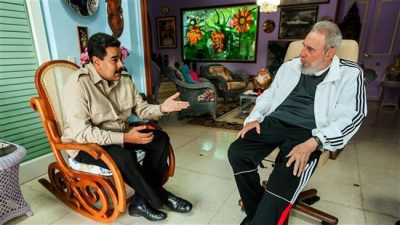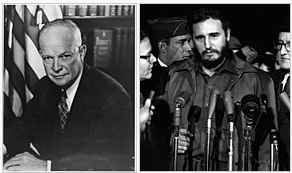Venezuela Must Draw Inspiration from Survival of Cuban Revolution
Independent observers have recognized that Nicolás Maduro won “fraud-proof” elections last year.

As the Soviet Union crumbled in December 1991, a Special Period unfolded in Cuba as she reeled from the disappearance of her principal commercial partner. In the late 1980s, over 85% of Cuba’s trade was tied to the USSR.
During those months that followed Soviet disintegration, Cuba was shorn of 80% of both its exports and imports, while her Gross Domestic Product (GDP) plunged by 34%. By comparison, America’s GDP fell by 30% during the Great Depression.
These were staggering blows for any nation to endure, let alone a state not much larger in size than Ireland. In 1989, the daily average intake of a Cuban adult was about 3,000 calories, an acceptable level of consumption by first world standards. Come 1993, the typical Cuban was living on 2,000 calories per day, and by 1995 it declined to around 1,800 calories. Gradual weight loss was witnessed throughout the country.
The Special Period still resembled nothing like a Siege of Leningrad scenario, in which 800,000 people starved to death during the Nazi blockade.
Incredibly, no person in Cuba died directly due to starvation, yet hunger was widespread initially, affecting children and the elderly most severely. Deprivations such as this had not been seen in Cuba since the pre-1959 days, when she was a virtual American colony and run like a traditional gangster’s paradise.
To overcome this crisis, the state’s leader Fidel Castro encouraged and promoted self-sufficient agriculture to take root in any available space across Cuba, including in parks and gardens. The Castro government dispatched teams of experts to train others in the mastery of independent farming, minus the use of harmful pesticides and fertilizers. By the mid-to-late 1990s, the situation was slowly improving as hunger pangs eased.
Cuba had also been a huge importer of oil from the USSR, and petroleum levels in the country subsequently dropped by 90%. Prior to 1991, for any Soviet petrol that Cuba did not consume, the island nation then re-exported to other countries which represented a crucial mode of income.
As a result, the Cuban population’s reliance upon automobiles was no longer a viable one. To offset this separate catastrophe, Castro imported over one million bicycles from the People’s Republic of China, which became an important ally.
Steps were implemented to manufacture a further 500,000 bicycles within Cuba itself, bringing the combined number to about two million. That is, almost one bicycle for every five people. For those who did not own a bicycle, public transport and carpooling were advised, along with walking.
As oil supplies were almost wiped out, Castro further reintroduced the dependence on the horse as a means of drawing carriages, a method which humankind had for thousands of years relied upon; but which has almost disappeared over past generations. The horse is an animal that boasts impressive strength and beauty, but which has been increasingly cast into the fields and stables, lying idle as the world became industrialized.
The modest selection of material stocks in Cuba, dwindling further during the Special Period, might not be as disastrous as it seems. In rich consumer societies, one can be bamboozled with the many brands of shampoo, toothpaste, soap, and so on. To exist in comfort, a human being requires only a limited set of goods and products. It is no bad thing for a person to sometimes live without certain luxuries, as it can make one appreciate such a thing far more when one has possession of it.
Image on the right: U.S president Dwight D. Eisenhower (left), and leader of Cuba Fidel Castro (right)
Meanwhile, driving Cuba’s massive reliance upon the USSR was an American embargo, first implemented during the latter end of Dwight D. Eisenhower’s presidency. In February 1962 the embargo was extended by Eisenhower’s successor, John F. Kennedy, to include almost all exports. Its punishing ramifications persist to the current day in opposition to almost entire world opinion.
Kennedy had instituted aggressive actions against Cuba, such as the illegal Bay of Pigs invasion of April 1961. It was followed by a covert campaign of terror known as Operation Mongoose, authorized via presidential consent in late 1961, with the ultimate aim of toppling Castro.
This CIA-administered scheme ranged from artillery and gun attacks against Cuba, to poisoning of crops and livestock, contamination of sugar exports, along with a range of plans to assassinate the Cuban leader. US government assaults lasted into the early 1980s, descending to acts of biological and chemical warfare, such as the introduction of African swine fever and dengue fever into Cuba.
In the meantime, Castro realized that his country must seek close ties with the Soviets for their revolution to survive – particularly in its early years when socialism was not yet deep-rooted in Cuba and under major attack.
Widespread aspersions that Cuba was “a Soviet client state” ranked as mischievous propaganda. The revolution swept to power in early 1959 without any assistance from the USSR. Entirely independent of Moscow were Castro’s policies such as the institution of world-renowned health and education systems, the eradication of homelessness, drug addiction and gambling, along with the Cuban-inspired liberation of southern Africa from apartheid.
Nelson Mandela, the South African political leader, held a strong reverence for Castro personally, describing him as “a tower of strength” and he remarked in summer 1991,
“The Cuban internationalists have made a contribution to African independence, freedom and justice unparalleled for its principled and selfless character” – and that the Cuban Revolution “has been a source of inspiration for all freedom loving people”.
As time progressed into the mid-1990s and beyond, far-sighted strategies enacted by Castro’s government, adapting to the adverse conditions, began to pay off. It came as a shock not only to elite US organizations that the socialist project in Cuba survived, but those in Russia like Mikhail Gorbachev were taken aback too.
Gorbachev noted that,
“Fidel held his ground and strengthened his country at the time of the harshest American blockade, at the time of massive pressure on him”.
Weighing all of the obstacles placed against Cuba, it is remarkable that their revolution exists into its 61st year. Along with the large-scale support of Cuba’s population, Castro can take ample credit in defying the most powerful nation in history – whose strongly militarized coastline in Key West, Florida, is just over 100 miles from Havana, Cuba’s capital.
Elsewhere, in South America, while the situation in Venezuela is indeed serious, the difficulties she faces may not be as severe as those experienced by Cuba. The crisis is undoubtedly a gruelling test of Nicolás Maduro‘s leadership, but the 56-year-old can take inspiration from that resilience demonstrated most abundantly by the Cubans.
Maduro should also draw courage from the many thousands of Cuban personnel in Venezuela, with the two Latin American nations now relying heavily upon each other.
It may be worth mentioning that Maduro is Venezuela’s democratically elected president, and is recognized as such by the United Nations. International observers have explicitly outlined, noting “the sophistication of the voting system” in May 2018, that Maduro won a “fraud-proof” election claiming more than 66% of votes.
The independent analysts highlight, “We were unanimous in concluding that the elections were conducted fairly”, and certain allegations to the contrary have been “of the most disgraceful kind”. Numerous claims that Maduro’s election victory was “fraudulent” are, therefore, disingenuous and without foundation.
In addition, it is somewhat outrageous that a youthful figure such as Juan Guaidó – unknown before Christmas to over 80% of Venezuelans – has “declared himself interim president”. Guaidó, a pawn of the White House, has committed a number of errors like publicly confirming his regular contact with Washington and tying himself so obviously to American business interests. It is a shameful episode and Guaidó will surely never have the legitimate support of Venezuela’s people.
The US government-led pressures and threats against Venezuela are furthermore a violation of the UN Charter, which was signed in San Francisco, California, during late June 1945. President Donald Trump, along with his National Security Advisor John Bolton, has said recently that “All options are on the table” with regard Venezuela, including a possible US military intervention.
The UN Charter, under Article 2, declares that,
“All members shall refrain in their international relations from the threat or use of force against the territorial integrity or political independence of any state, or in any other manner inconsistent with the Purposes of the United Nations”.
Once more, the old charter is being shredded to pieces. That Venezuela contains 20% of the world’s known oil reserves is of more importance to some than refraining “from the threat or use of force”, which is against international law to begin with.
*
Note to readers: please click the share buttons below. Forward this article to your email lists. Crosspost on your blog site, internet forums. etc.
Shane Quinn obtained an honors journalism degree. He is interested in writing primarily on foreign affairs, having been inspired by authors like Noam Chomsky. He is a frequent contributor to Global Research.


